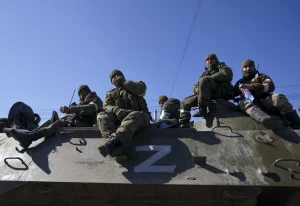
Ukrainian economy and producers have lost over EUR 1.5 billion due to blockade of the border — Ukrainian Agri Council
The blockade will also affect trade in 2024, as many producers who were forced to wait in lines lost potential contracts with representatives in an EU zone.
Denys Marchuk, deputy chairman of the Ukrainian Agri Council, shared the information during a briefing at the Ukraine-Uninform Media Center.
"If we talk about the consequences of the blockade itself, first of all, we need to remember the consequences of the first bans on the import of Ukrainian products in May-September, when the ban on the import of Ukrainian products to five Eastern European countries was in effect. Then, the consequence of all these actions was the blockades of the crossing points between Ukraine and Poland by Polish hauliers and Polish farmers. If you calculate the losses to the country’s economy in November and all of December, including producers, they exceed EUR 1.5 billion. These are quite large funds, which the Ukrainian budget, as well as producers, logistics companies, and all those connected to the import and export of products from and to the territory of Ukraine, did not receive on time," Marchuk said.
According to him, the echo of the blockades will be felt throughout 2024, as a significant number of producers who were forced to stand in lines lost potential contracts with representatives in the European zone.
"I have firsthand knowledge of cases when (companies – Ed.) were unable to deliver products on time, and hypermarkets refused to cooperate with them, and therefore, this business actually cannot ensure to export the corresponding products in this direction in the future based on its pre-established plans," he added.
Strikes on the Polish-Ukrainian border: what is known
On November 6, Polish carriers initiated a strike at the border. The Ministry of Infrastructure noted that no official demands had been submitted by the Polish carriers to Kyiv.
On November 9, a meeting of government officials and carriers blocking the border with Ukraine took place in Poland, but it concluded without any resolution. Simultaneously, the lines of trucks are growing longer. Consequently, Ukraine has suggested to the Polish authorities the initiation of lanes for empty trucks and is currently awaiting their response.
On November 15, trilateral talks with Poland and the European Commission on unblocking the crossing points took place, but they did not yield any results. Instead, the European Commission may initiate measures against Poland if the authorities do not resolve the issue of carriers blocking checkpoints on the border with Ukraine.
Polish carriers have promised to tighten the blockade on the border with Ukraine. In addition, customs officers have begun to record an increase in truck queues in the Slovak direction.
Ukraine and Poland are preparing claims for damages caused by the blockade of border crossing points due to the rally of Polish carriers. In addition, it has been reported that Polish carriers are not allowing humanitarian aid and dangerous goods to pass through.
According to Volodymyr Balin, vice president of the Association of International Road Carriers, Polish carriers are violating the terms of the strike, which could help to get it called off. At the same time, the Ukrainian economy has already suffered losses of more than €400 million.
Meanwhile, the Polish government has called on Ukraine to cancel the e-queue registration for empty trucks. Poland’s Minister of Agriculture also met with the protesters and offered them a compromise solution.
On December 1, the blocked Ukrainian drivers at the Polish border held talks with the consul. On December 4, the Uhryniv-Dolhobyczów border crossing point opened to empty trucks.
On December 4, the EU Transport, Telecommunications and Energy Council (TTE) will discuss the situation with the blockade on the Polish-Ukrainian border.
As a result of the protesters' blocking of the border with Ukraine, exports through these checkpoints decreased by 40%, and the state budget of Ukraine lost UAH 9.3 billion due to a shortfall in customs payments.
Later it became known that the trucks blocked on the border with Poland would be returned to Ukraine by rail. On the evening of December 7, Ukrainian Railways sent the first container train with trucks to Poland, consisting of 23 platforms with 13 loaded tractors and semi-trailers.
On December 11, truck traffic was unblocked at the Polish-Ukrainian border through the Yahodyn-Dorohusk checkpoint.
The European Commission called for the unblocking of all checkpoints on the border with Poland.
On December 14, the mayor of the Polish commune of Dorohusk, Wojciech Sawa, did not allow carriers to block the Yahodyn-Dorohusk checkpoint on the border with Ukraine.
However, on December 15, the District Court in Lublin has overturned the ban of Wojciech Sawa, head of the Dorohusk Commune.
On December 18, Polish farmers from the United Village union said they would join the border blockade in Dorohusk, starting on Monday, December 18.
On Saturday, December 23, Polish farmers suspended their protests at the Shehyni-Medyka border crossing point. The new Polish government said it would hold talks with the protesters.
On January 4, they resumed the blockade of the border crossing and said they planned to protest until February 3.
Deputy Minister of Communities, Territories and Infrastructure Development Serhiy Derkach said that Ukraine has fulfilled its part of the action plan agreed with the Polish government to unblock the border with Ukraine by Polish carriers. Now Kyiv is waiting for further steps from Warsaw.
On January 16, Polish hauliers ended their protest on the border with Ukraine.
- News











































